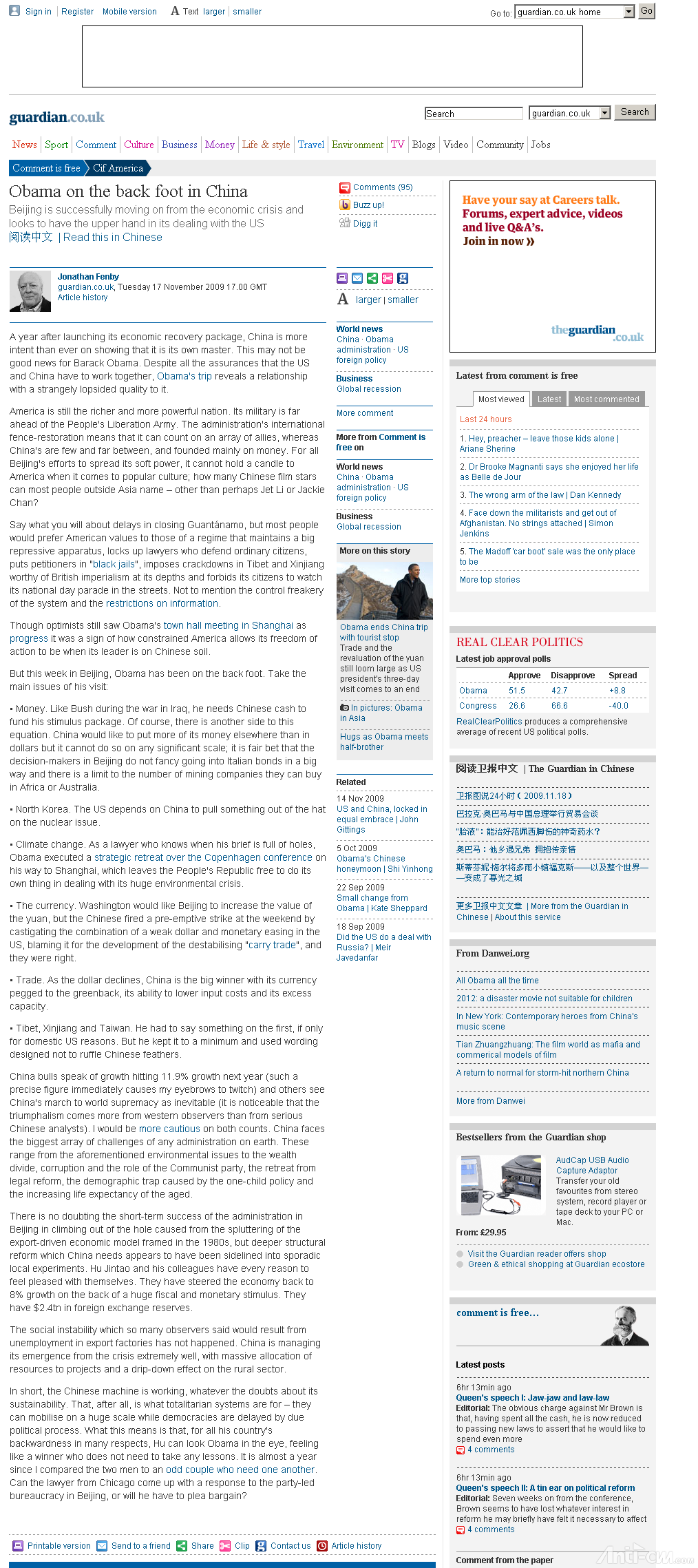|
|
本帖最后由 I'm_zhcn 于 2009-11-20 02:08 编辑
Obama on the back foot in China
http://www.guardian.co.uk/commentisfree/cifamerica/2009/nov/17/obama-back-foot-china
Jonathan Fenby Tuesday 17 November 2009 17.00 GMT
Beijing is successfully moving on from the economic crisis and looks to have the upper hand in its dealing with the US
A year after launching its economic recovery package, China is more intent than ever on showing that it is its own master. This may not be good news for Barack Obama. Despite all the assurances that the US and China have to work together, Obama's trip reveals a relationship with a strangely lopsided quality to it.
America is still the richer and more powerful nation. Its military is far ahead of the People's Liberation Army. The administration's international fence-restoration means that it can count on an array of allies, whereas China's are few and far between, and founded mainly on money. For all Beijing's efforts to spread its soft power, it cannot hold a candle to America when it comes to popular culture; how many Chinese film stars can most people outside Asia name – other than perhaps Jet Li or Jackie Chan?
Say what you will about delays in closing Guantánamo, but most people would prefer American values to those of a regime that maintains a big repressive apparatus, locks up lawyers who defend ordinary citizens, puts petitioners in "black jails", imposes crackdowns in Tibet and Xinjiang worthy of British imperialism at its depths and forbids its citizens to watch its national day parade in the streets. Not to mention the control freakery of the system and the restrictions on information.
Though optimists still saw Obama's town hall meeting in Shanghai as progress it was a sign of how constrained America allows its freedom of action to be when its leader is on Chinese soil.
But this week in Beijing, Obama has been on the back foot. Take the main issues of his visit:
• Money. Like Bush during the war in Iraq, he needs Chinese cash to fund his stimulus package. Of course, there is another side to this equation. China would like to put more of its money elsewhere than in dollars but it cannot do so on any significant scale; it is fair bet that the decision-makers in Beijing do not fancy going into Italian bonds in a big way and there is a limit to the number of mining companies they can buy in Africa or Australia.
• North Korea. The US depends on China to pull something out of the hat on the nuclear issue.
• Climate change. As a lawyer who knows when his brief is full of holes, Obama executed a strategic retreat over the Copenhagen conference on his way to Shanghai, which leaves the People's Republic free to do its own thing in dealing with its huge environmental crisis.
• The currency. Washington would like Beijing to increase the value of the yuan, but the Chinese fired a pre-emptive strike at the weekend by castigating the combination of a weak dollar and monetary easing in the US, blaming it for the development of the destabilising "carry trade", and they were right.
• Trade. As the dollar declines, China is the big winner with its currency pegged to the greenback, its ability to lower input costs and its excess capacity.
• Tibet, Xinjiang and Taiwan. He had to say something on the first, if only for domestic US reasons. But he kept it to a minimum and used wording designed not to ruffle Chinese feathers.
China bulls speak of growth hitting 11.9% growth next year (such a precise figure immediately causes my eyebrows to twitch) and others see China's march to world supremacy as inevitable (it is noticeable that the triumphalism comes more from western observers than from serious Chinese analysts). I would be more cautious on both counts. China faces the biggest array of challenges of any administration on earth. These range from the aforementioned environmental issues to the wealth divide, corruption and the role of the Communist party, the retreat from legal reform, the demographic trap caused by the one-child policy and the increasing life expectancy of the aged.
There is no doubting the short-term success of the administration in Beijing in climbing out of the hole caused from the spluttering of the export-driven economic model framed in the 1980s, but deeper structural reform which China needs appears to have been sidelined into sporadic local experiments. Hu Jintao and his colleagues have every reason to feel pleased with themselves. They have steered the economy back to 8% growth on the back of a huge fiscal and monetary stimulus. They have $2.4tn in foreign exchange reserves.
The social instability which so many observers said would result from unemployment in export factories has not happened. China is managing its emergence from the crisis extremely well, with massive allocation of resources to projects and a drip-down effect on the rural sector.
In short, the Chinese machine is working, whatever the doubts about its sustainability. That, after all, is what totalitarian systems are for – they can mobilise on a huge scale while democracies are delayed by due political process. What this means is that, for all his country's backwardness in many respects, Hu can look Obama in the eye, feeling like a winner who does not need to take any lessons. It is almost a year since I compared the two men to an odd couple who need one another. Can the lawyer from Chicago come up with a response to the party-led bureaucracy in Beijing, or will he have to plea bargain?

|
back, China, Foot, Obama, back, China, Foot, Obama, back, China, Foot, Obama
评分
-
1
查看全部评分
-
|